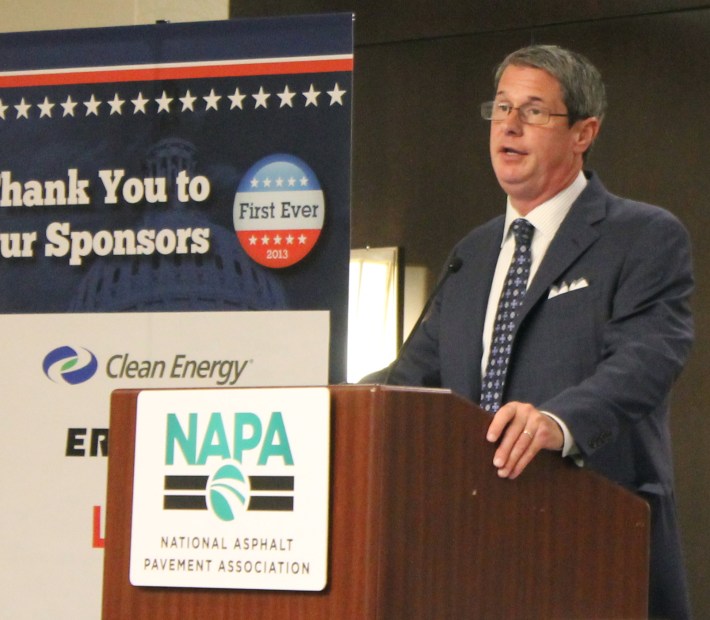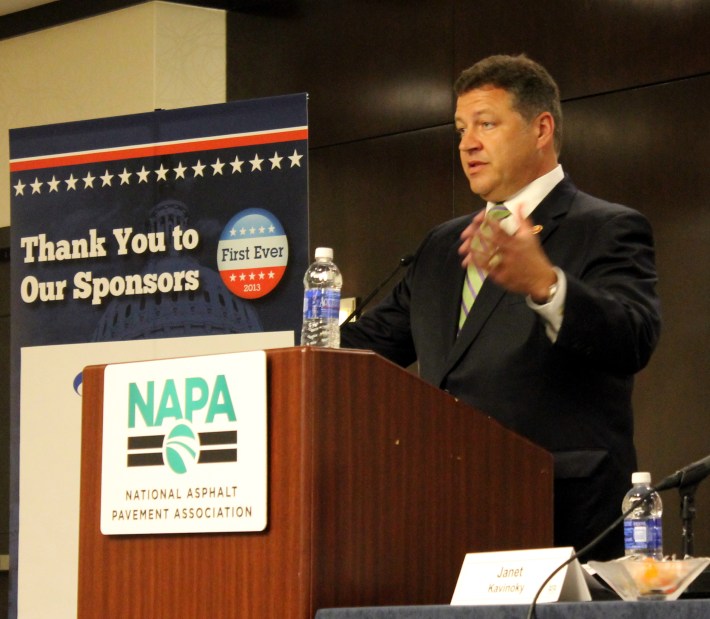Well here’s a sobering thought: Transit advocates, cyclists and the road lobby have the same talking points these days. All anyone is talking about is how to rescue the Highway Trust Fund from its own fiscal cliff.

I attended yesterday’s “Asphalt Fly-In,” the National Asphalt Pavement Association’s first-ever Washington legislative conference. If I went in expecting to hear outrageous things about starving out transit and bike/ped or eliminating the last remaining environmental safeguards, I came out disappointed. The only eyebrow-raising moment was the off-color joke some asphalt lobbyist opened with. It was, at least, extremely off-color.
While asphalt lobbyists want more cash to widen highways and build roads to nowhere, and reformers just want to make sure that limited funding doesn't squeeze out things like transit and bike/ped projects entirely, it all comes down to the same demand.
House Transportation Committee Chair Bill Shuster told the asphalt industry representatives that while it’s hard for lawmakers to agree on anything when it comes to taxes, “when they talk about revenues, the one area of revenues that seems to brings them together, or at least makes them talk, are revenues when it comes to the transportation system.”
But that doesn’t mean finding a solution will be easy.
Sen. David Vitter, the top Republican on the Senate Environment and Public Works Committee, said he understands that the current limitations on the Highway Trust Fund are just “an accident of history” and need to be revisited -- presumably by raising the gas tax.
“Somehow it’s a core conservative principle that whatever is there now as the current federal gas tax, that’s it and that’s written in stone that Moses brought down from the mountain,” Vitter said. He added that he’s “open to updating that financing system” but here’s the catch -- it can’t be a “net tax increase for middle-class taxpayers.”
That means any gas tax increase needs to be “offset” by other tax reductions. So essentially what Vitter is arguing for is just another bailout -- moving money around within the federal budget, beefing up one pot while shrinking another. Where would it come from? “That’s the $64,000 question,” he said. The only new revenue he would support without an offset would be from oil drilling -- an option Shuster also highlighted in his remarks.
Vitter said this would all be easier in the context of overall tax reform, but he doesn’t see that coming anytime soon.
“There have been some proposals to completely replace the gas tax with something else,” Vitter said, “but that something shouldn’t net more so you need another offset.” So he’s arguing for a solution to the revenue shortfall that explicitly prohibits solving the revenue shortfall.
As Senate Republican aide Alex Herrgott told the audience, Republican lawmakers fall into three “buckets” on the funding issue: First, there are those like his boss, Sen. James Inhofe, who believes in limiting government except when it comes to national security and infrastructure. (Here Herrgott noted, to his enormous credit, that infrastructure isn’t a jobs issue -- it’s a “long-term viability” issue.) Second, there are some lawmakers like Tennessee Senator Bob Corker, who “likes highways” but thinks the country should live within the constraints of the Highway Trust Fund. And third, there are the devolutionists who think infrastructure should be the responsibility of the states, not the federal government.

No one is more eloquent than Bill Shuster on the historical and economic basis in conservative thought for a federal role in infrastructure building and maintenance. He’s been selling that point to the Tea Party since he became chair. But Herrgott said the “second bucket” is where lobbyists should focus their efforts. (Although he and Shuster agreed that the asphalt industry shouldn’t be the ones pushing the message, since they’ll just look like “rent-seekers.”)
Congress has a lot on its plate and members, still in the mindset of the five- or six-year transportation bill, might think transportation is one issue they can cross off their lists, since MAP-21 passed so recently. But funding is a big fight that will take a long time, and there’s very little wiggle room, since the Highway Trust Fund bottoms out next year.
House T&I staffer Murphie Barrett maintains -- as does Sen. Barbara Boxer -- that MAP-21 is a six-year bill when it came to policy, having made lasting changes on everything from program consolidation to environmental “streamlining.” That’s a mindset reformers will face when bill negotiations ramp back up -- they’ll be swimming upstream if they suggest that MAP-21 left many key reforms on the table.
As an aside: It’s amazing how much Republicans pat themselves on the back for MAP-21, considering that the Republican-led House couldn’t even get themselves together to present a bill to vote on. Still, they managed to extract much of what they wanted in conference, and they’re satisfied that it’s a “landmark” bill that achieved many of their goals. Perhaps in the next round, advocates for sustainable and active transportation will have their moment in the sun.
What everyone agrees on is that the heavy lift now is on funding. Many Republicans maintain that the transportation sector must be funded with nothing more than the 20-year-old gas tax, with no bailouts and no new revenues. But last year, GOP proposals to cut spending levels by a third, to eliminate transit funding from the Highway Trust Fund, and to pay for transportation with oil drilling were all resoundingly rejected. There’s simply no way to meet all those conditions.
As Shuster noted, the committees responsible for transportation can’t do more than make proposals on funding. The Finance Committee in the Senate and Ways and Means in the House will make a final decision on how to fund transportation. And as Herrgott said, “The Senate Finance Committee is scared to death of trying to find [revenues]… Everybody knows where we need to find revenue and nobody wants to go get it.”
While states have stepped up their efforts to raise money themselves, it’s been a steep climb. “Over the last four or five years, we’ve tried it all in Pennsylvania,” Shuster said. “We’ve tried a public-private partnership with the Pennsylvania Turnpike, the granddaddy of all toll roads, and they failed to get that through the legislature. They tried to use the pilot project from TEA-21 to toll I-80 across the north and couldn’t get that done. And they tried to do things with taxing at the pump, the user fee. They’ve failed on all three of those.”
With time running out and the polarization on spending as acute as ever, one likely and unsavory scenario, and the one Herrgott said scares him the most, would be “a bunch of short-term [extensions] with small little cuts -- 2 percent, 3 percent -- that help provide some cover for conservatives to vote” for them.
Observers are getting frustrated that even while more lawmakers, like Vitter, are coming around to acknowledge that transportation needs more money, there have been no proposals to debate. No one has come forward with an idea that can be debated. All anyone wants to say is that “everything is on the table.”
Take heart, Shuster said: This is just the way the game is played.
“The surest way to kill something is to get out there way far in front before anything is possible,” Shuster said. “Folks in the media and both sides of aisle will beat it to death and it’ll be dead. You’ve got to figure out when the timing is right.”





